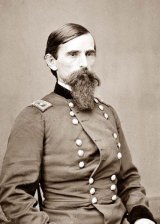Ben-Hur Page #16
Ben-Hur: A Tale of the Christ is a novel by Lew Wallace, published by Harper and Brothers on November 12, 1880, and considered "the most influential Christian book of the nineteenth century". It became a best-selling American novel, surpassing Harriet Beecher Stowe's Uncle Tom's Cabin in sales.
marah, and by nightfall had everything safe in the field; then they kindled a fire down by the gate, partook of their humble supper, and sat down to rest and talk, leaving one on watch. There were six of these men, omitting the watchman; and afterwhile they assembled in a group near the fire, some sitting, some lying prone. As they went bareheaded habitually, their hair stood out in thick, coarse, sunburnt shocks; their beard covered their throats, and fell in mats down the breast; mantles of the skin of kids and lambs, with the fleece on, wrapped them from neck to knee, leaving the arms exposed; broad belts girthed the rude garments to their waists; their sandals were of the coarsest quality; from their right shoulders hung scrips containing food and selected stones for slings, with which they were armed; on the ground near each one lay his crook, a symbol of his calling and a weapon of offence. Such were the shepherds of Judea! In appearance, rough and savage as the gaunt dogs sitting with them around the blaze; in fact, simple-minded, tender-hearted; effects due, in part, to the primitive life they led, but chiefly to their constant care of things lovable and helpless. They rested and talked, and their talk was all about their flocks, a dull theme to the world, yet a theme which was all the world to them. If in narrative they dwelt long upon affairs of trifling moment; if one of them omitted nothing of detail in recounting the loss of a lamb, the relation between him and the unfortunate should be remembered: at birth it became his charge, his to keep all its days, to help over the floods, to carry down the hollows, to name and train; it was to be his companion, his object of thought and interest, the subject of his will; it was to enliven and share his wanderings; in its defense he might be called on to face the lion or robber--to die. The great events, such as blotted out nations and changed the mastery of the world, were trifles to them, if perchance they came to their knowledge. Of what Herod was doing in this city or that, building palaces and gymnasia, and indulging forbidden practises, they occasionally heard. As was her habit in those days, Rome did not wait for people slow to inquire about her; she came to them. Over the hills along which he was leading his lagging herd, or in the fastnesses in which he was hiding them, not unfrequently the shepherd was startled by the blare of trumpets, and, peering out, beheld a cohort, sometimes a legion, in march; and when the glittering crests were gone, and the excitement incident to the intrusion over, he bent himself to evolve the meaning of the eagles and gilded globes of the soldiery, and the charm of a life so the opposite of his own. Yet these men, rude and simple as they were, had a knowledge and a wisdom of their own. On Sabbaths they were accustomed to purify themselves, and go up into the synagogues, and sit on the benches farthest from the ark. When the chazzan bore the Torah round, none kissed it with greater zest; when the sheliach read the text, none listened to the interpreter with more absolute faith; and none took away with them more of the elder's sermon, or gave it more thought afterwards. In a verse of the Shema they found all the learning and all the law of their simple lives--that their Lord was One God, and that they must love him with all their souls. And they loved him, and such was their wisdom, surpassing that of kings. While they talked, and before the first watch was over, one by one the shepherds went to sleep, each lying where he had sat. The night, like most nights of the winter season in the hill country, was clear, crisp, and sparkling with stars. There was no wind. The atmosphere seemed never so pure, and the stillness was more than silence; it was a holy hush, a warning that heaven was stooping low to whisper some good thing to the listening earth. By the gate, hugging his mantle close, the watchman walked; at times he stopped, attracted by a stir among the sleeping herds, or by a jackal's cry off on the mountain-side. The midnight was slow coming to him; but at last it came. His task was done; now for the dreamless sleep with which labor blesses its wearied children! He moved towards the fire, but paused; a light was breaking around him, soft and white, like the moon's. He waited breathlessly. The light deepened; things before invisible came to view; he saw the whole field, and all it sheltered. A chill sharper than that of the frosty air--a chill of fear--smote him. He looked up; the stars were gone; the light was dropping as from a window in the sky; as he looked, it became a splendor; then, in terror, he cried, "Awake, awake!" Up sprang the dogs, and, howling, ran away. The herds rushed together bewildered. The men clambered to their feet, weapons in hand. "What is it?" they asked, in one voice. "See!" cried the watchman, "the sky is on fire!" Suddenly the light became intolerably bright, and they covered their eyes, and dropped upon their knees; then, as their souls shrank with fear, they fell upon their faces blind and fainting, and would have died had not a voice said to them, "Fear not!" And they listened. "Fear not: for behold, I bring you good tidings of great joy, which shall be to all people." The voice, in sweetness and soothing more than human, and low and clear, penetrated all their being, and filled them with assurance. They rose upon their knees, and, looking worshipfully, beheld in the centre of a great glory the appearance of a man, clad in a robe intensely white; above its shoulders towered the tops of wings shining and folded; a star over its forehead glowed with steady lustre, brilliant as Hesperus; its hands were stretched towards them in blessing; its face was serene and divinely beautiful. They had often heard, and, in their simple way, talked, of angels; and they doubted not now, but said, in their hearts, The glory of God is about us, and this is he who of old came to the prophet by the river of Ulai. Directly the angel continued: "For unto you is born this day, in the city of David, a Savior, which is Christ the Lord!" Again there was a rest, while the words sank into their minds. "And this shall be a sign unto you," the annunciator said next. "Ye shall find the babe, wrapped in swaddling-clothes, lying in a manger." The herald spoke not again; his good tidings were told; yet he stayed awhile. Suddenly the light, of which he seemed the centre, turned roseate and began to tremble; then up, far as the men could see, there was flashing of white wings, and coming and going of radiant forms, and voices as of a multitude chanting in unison, "Glory to God in the highest, and on earth peace, good-will towards men!" Not once the praise, but many times. Then the herald raised his eyes as seeking approval of one far off; his wings stirred, and spread slowly and majestically, on their upper side white as snow, in the shadow vari-tinted, like mother-of-pearl;
Translation
Translate and read this book in other languages:
Select another language:
- - Select -
- 简体中文 (Chinese - Simplified)
- 繁體中文 (Chinese - Traditional)
- Español (Spanish)
- Esperanto (Esperanto)
- 日本語 (Japanese)
- Português (Portuguese)
- Deutsch (German)
- العربية (Arabic)
- Français (French)
- Русский (Russian)
- ಕನ್ನಡ (Kannada)
- 한국어 (Korean)
- עברית (Hebrew)
- Gaeilge (Irish)
- Українська (Ukrainian)
- اردو (Urdu)
- Magyar (Hungarian)
- मानक हिन्दी (Hindi)
- Indonesia (Indonesian)
- Italiano (Italian)
- தமிழ் (Tamil)
- Türkçe (Turkish)
- తెలుగు (Telugu)
- ภาษาไทย (Thai)
- Tiếng Việt (Vietnamese)
- Čeština (Czech)
- Polski (Polish)
- Bahasa Indonesia (Indonesian)
- Românește (Romanian)
- Nederlands (Dutch)
- Ελληνικά (Greek)
- Latinum (Latin)
- Svenska (Swedish)
- Dansk (Danish)
- Suomi (Finnish)
- فارسی (Persian)
- ייִדיש (Yiddish)
- հայերեն (Armenian)
- Norsk (Norwegian)
- English (English)
Citation
Use the citation below to add this book to your bibliography:
Style:MLAChicagoAPA
"Ben-Hur Books." Literature.com. STANDS4 LLC, 2024. Web. 26 Nov. 2024. <https://www.literature.com/book/ben-hur_1675>.




Discuss this Ben-Hur book with the community:
Report Comment
We're doing our best to make sure our content is useful, accurate and safe.
If by any chance you spot an inappropriate comment while navigating through our website please use this form to let us know, and we'll take care of it shortly.
Attachment
You need to be logged in to favorite.
Log In